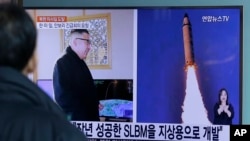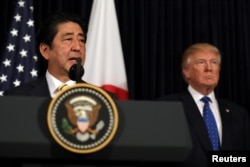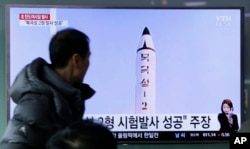The U.N. Security Council is set to hold emergency talks Monday about North Korea's latest ballistic missile launch.
U.N. Secretary-General Antonio Guterres called the missile test a "further troubling violation" of U.N. resolutions.
Guterres said in a statement that Pyongyang "must return to full compliance with its international obligations and to the path of denuclearization."
The United States, Japan and South Korea requested the session, which is scheduled for the afternoon.
North Korea launched the missile Sunday morning, and South Korean military officials said it traveled about 500 kilometers before landing in the Sea of Japan.
The state news agency KCNA said Kim "expressed great satisfaction over the possession of another powerful nuclear attack means, which adds to the tremendous might of the country."
Chinese Foreign Ministry spokesman Geng Shuang said Monday China opposed the launch, which violated U.N. Security Council resolutions. He added that China, one of the five permanent Security Council members, urges all sides to refrain from any provocative acts and believes dialogue is the path to a resolution.
Russia's Foreign Ministry also expressed concern Monday about the missile launch.
Japanese Prime Minister Shinzo Abe called North Korea's actions "absolutely intolerable."
Abe's comments came at a news conference alongside U.S. President Donald Trump during a visit to Florida.
"North Korea must fully comply with the relevant U.N. Security Council resolutions," the Japanese leader said. "During the summit meeting that I had with President Trump, he assured me that the United States will always (be with) Japan 100 percent, and to demonstrate his determination as well as commitment, he is here with me at his joint press conference."
Trump said: "I just want everybody to understand and fully know that the United States stands behind Japan, its great ally, 100 percent."
The North Korean test was widely interpreted as a challenge to the Trump administration.
NATO Secretary-General Jens Stoltenberg also condemned the launch, calling it a further violation by Pyongyang of multiple U.N. Security Council resolutions.
North Korea conducted two unauthorized nuclear test explosions last year and launched nearly two dozen rockets in continuing efforts to expand its nuclear weapons and missile programs. Kim declared in a speech on New Year's Day that his country has "reached the final stage" in its program to build ICBMs (Inter-Continental Ballistic Missile), but Western experts have been skeptical about his forecast.
At the time, Trump answered Kim's ICBM boast with one of his trademark curt Twitter messages: "It won't happen!"
Harry Kazianis, the director of Defense Studies at the Center for the National Interest in Washington said North Korea wanted to provoke Trump with Sunday’s missile launch, but did not want to risk an ICBM test that might fail.
“I think the North Koreans would be a little bit afraid that if (an ICBM) test failed that would obviously not make them look very good,” he said.
North Korea watchers reported late in January that the North Korean military had loaded missiles aboard two mobile launchers, a sign that test-firings could be imminent. They noted at the time, however, that the missiles appeared to be no more than 15 meters long, which would tend to rule out the possibility that a long-range weapon was involved.
Analysts are divided over how close Pyongyang is to realizing its full military ambitions, especially since it has never successfully test-fired an ICBM. Most experts, however, agree that the North has made considerable progress since Kim took over absolute power in the country following the death of his father, Kim Jong Il, in December 2011.
Talks broke down in 2009
For more than a decade, the U.S. and a vast majority of world governments have demanded that North Korea denuclearize the Korean peninsula. Western leaders, however, have yet to devise a plan that would either compel the North to cooperate or create incentives for it to do so.
China-sponsored talks between Pyongyang and a six-nation panel have been stalled since 2009, when the communist North pulled out of the negotiations. The North had carried out its first underground nuclear test explosion three years before the talks broke down.
The U.S. has since said the six-party talks could not resume until Kim's government in Pyongyang would recommit itself to halting all nuclear tests and scrapping its nuclear development program. That policy was agreed to during the administration of former President Barack Obama, and President Trump's government has reaffirmed it.
Pyongyang has so far rejected Western overtures and continues to resist world leaders' attempts to bring it into compliance with a string of United Nations resolutions.














